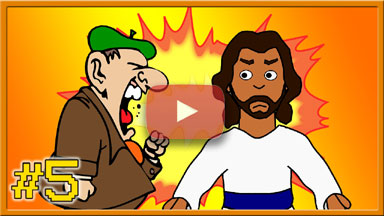Site last updated on August 9th, 2025.
Site last updated on August 9th, 2025.
Click on the quote below to read the article...

"A live-by-faith, work-for-God-not-money Christian community. We distribute Bible-based comics, videos, CDs, novels, and other tracts, and do free (voluntary) work. We are against hypocrisy and self-righteousness in the church; and we are in favour of honesty, humility and love."
- Details

When we talk of people killing us one day because of what we believe, it's easy to think that we are suffering from paranoia. Certainly it's a bit much to think that we are going to be persecuted just for teaching people to seek wisdom, to be sincere, and/or to follow the teachings of Jesus. Or is it?
Ask yourself, "Why was Jesus crucified?" I'm not talking about the theological answers (i.e. so that he could save the world, etc.), but rather, "What were the human factors that led up to people hating him so much that they wanted to see him tortured to death?"
The topic is not thought about much by religious people, because they subconsciously assume that what happened 2,000 years ago was all engineered by God, possibly even in opposition to the free will of the people involved. When they think like that, they miss the powerful relevance of the death of Jesus.
Jesus said that the same sort of people who had rejected him would also reject his followers. (John 15:20-21) And sure enough! Most of his first followers were killed for their faith.
But we in the Twenty-first Century have come to believe that followers of Jesus are, on the whole, popular, successful, and powerful people. Why is this? Isn't it because the people who are now generally regarded as "Christians" are not really followers of Jesus?
You only have to take a glance at the teachings of Jesus to see that he wasn't advocating the construction of big cathedrals, nor was he teaching that people only had to attend weekly meetings, or say a little prayer and all would be right between them and God. The modern institutional church bears about as much resemblance to Jesus and his twelve disciples as communism does to capitalism.
So what did Jesus and his followers teach, that caused them to be hated so?
In a word, he taught love. But that hardly sounds like something a person would get killed for. The difference, however, is that Jesus was talking about the real thing.
The Bible says, "This is how we know God loves us, because he laid down his life for us; and we ought to lay down our lives for one another. Whoever has this world's goods and sees a brother in need, then shuts up his bowels of compassion from that person, how can they say the love of God dwells in them?" (1 John 3:16-17)
In another place, Jesus said, "I am giving you a new commandment: that you love one another as I have loved you." (John 13:34) Loving one another was not a new commandment. Love was taught in the Old Testament. But what made the commandment new were the final five words: "...as I have loved you." Jesus demonstrated the kind of love he wanted.
Love that is prepared to die for the recipient is convicting love. When Jesus said to the multitudes, "Whoever does not forsake all that they own cannot be my follower" (Luke 14:33), he was telling them how to express the kind of love that he taught. He had earlier stated that this "forsaking all" must be so all-encompassing that it would even include laying down your life for God and others. (Luke 14:27)
So how do people react when they come in touch with such love? While it is helping them personally, the reaction can be very positive. Jesus was loved by the multitudes during much of his ministry. They all wanted to receive something from him. But even this popularity angered the religious leaders, who were jealous.
I'll give a tiny illustration of how this can work. A few years ago we volunteered to teach scripture classes for a number of different churches in a small town in Australia. In an effort to make the classes more interesting for the children, we would play games and have competitions associated with the material that they needed to learn. We would take lollies with us to be used as prizes. It wasn't long before the minister in charge of the scripture teachers told us that we could no longer offer prizes, because it made the other scripture teachers look mean by comparison (because they were not willing to pay for lollies out of their own pockets, like we had). It wasn't that the other teachers could not afford such treats for the children; it was just that they did not feel that they should have to go that far in expressing their love for the students. And if they wouldn't, we shouldn't.
Obviously if we had been performing miracles or doing something far more spectacular, like Jesus did, the other teachers would have been even more upset.
We started producing a free newspaper for the town as well, and we published it fortnightly. We did not sell ads, but instead, we paid for it all ourselves. In it, we offered free coverage to all of the local churches, as well as general news and sports coverage. We set up a second-hand shop in the town, providing all of the voluntary labour ourselves, and we split the proceeds between all of the churches. We undertook a number of other voluntary projects for the good of the community as well. All we were doing was trying to show love for others.
In the end, however, we were virtually run out of town by the local churches whom we were trying to help.
One of the local ministers had sexually molested a young boy after scripture classes, and the boy identified him. But the local pentecostals got a "revelation" that I was the real culprit. The police asked the boy if this was so and he confidently denied it.
But it did not stop the churches from spreading their lies all over town about me. The fact that I was overseas at the time that the assault took place didn't seem to bother them when it came to making up such slander! The police did not even take the time to interview me, as they could see through the jealousy of the churches. The local Pentecostal pastor was, however, identified by the lad, and charged accordingly.
Jesus said, as he was being led to his execution, "If they do these things in a green tree, what shall be done in a dry one?" (Luke 23:31) In other words, he came at one of the most spiritually prime times in history, and if those people killed him, then what would a less spiritual world do to such a person?
Referring to the last days in the history of the world, Jesus said that at that time, "The love of many shall wax cold." (Matthew 24:12) I believe that we are living in those days. "Love" now is a cold, selfish, superficial emotion that people "fall" into and fall out of. Even in marriage, lifetime commitments "for better or for worse" are becoming more and more rare; and a love that would cause someone to actually die for another person hardly exists.
Because of our short life span, it is difficult for us to know if the world today really is significantly different (in terms of spiritual attitudes) to what it was like 2,000 years ago. However, we need only turn to the literature of the past couple of centuries to be able to see a dramatic trend away from the kind of love that would literally die for another person.
In the Nineteenth Century, literary heroes and heroines would regularly lay down their lives for others. Originally The Little Mermaid, for example, finished with the mermaid dying, not just for love of the young prince, but more importantly, because of her love for God. Walt Disney could never market such an ending today, and so it has been changed.
We experience the rejection that Jesus felt, whenever we mention the teachings of Jesus. As long as we are vague, as though each person is free to imagine in their own minds what it is that their own personal "Jesus" wants them to do (and they usually imagine that he just wants to bless them with more wealth or better health), there is no rejection of us. But when it hits them that we are talking about actually pulling out a Bible and reading his teachings, and then trying to obey them, a dark wall goes up between us and the people we are talking to.
Religious people, non-religious people, rich people, poor people, close friends, relatives, and others suddenly do not want to have anything to do with us. They are not prepared to forsake everything they have, for God or for anyone else, and so they do not want to hear the truth, i.e. that Jesus said that true love will require a person to do just that.
Today's heroines dump their husbands in order to further their careers. Today's heroes finish up winning the basketball competition. And it happens because today's public doesn't want to hear about the kind of character that does the right thing even when it does not work to their own personal selfish advantage.
Is it any wonder that we say the world will reject us for harping on the teachings of Jesus? And if we harp long enough, even after they've turned their backs, told their lies, and accused us of being paranoid (as the Jews did with Jesus), then, yes, death too will await us, somewhere down the track.
(See also Cognitive Dissonance.)
Register or log in to take the quiz for this article




















